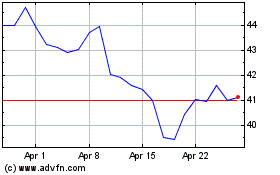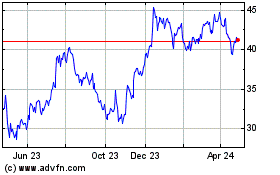How Paperwork For Two Massachusetts Mortgages Tripped Up Banks
January 10 2011 - 4:18PM
Dow Jones News
Fears about the costs for banks from foreclosure document
problems re-emerged Friday, when a high court in Massachusetts
ruled in favor of two defaulted home borrowers whose mortgages had
been securitized.
The court affirmed a lower court's ruling that the trail of
paperwork for two Springfield, Mass., mortgages wasn't complete.
That judgment spooked investors in banks that own piles of
mortgage-backed securities, on fears they could be left without
recourse to recover soured loans.
The question of who holds the legal right to the mortgage, and
therefore the home, has become yet another hole the banks need to
plug to convince investors they have the flood of legal issues from
foreclosures under control.
This hole specifically arises from the complicated process a
mortgage goes through when being securitized, a process that
ultimately has provided the grease for mortgage creation in the
U.S.
For instance, the loan taken out by Antonio Ibanez, one of the
defendants in the Massachusetts case, was sold at least four times
from the time he took the loan to the time it was foreclosed on,
according to the court documents.
Ibanez had first gotten his adjustable-rate subprime loan from a
mortgage originator called Rose Mortgage. Ibanez signed what is
known as the note, a promissory note that details the conditions of
the loan and gives the holder the right to the collateral. Rose
Mortgage then, according to the court papers, properly transferred
the mortgage and the note to Option One, then an arm of H&R
Block Inc. (HRB) which gathered mortgages and sold them to Wall
Street.
Option One endorsed the note without an officially designated
new owner, instead using "payable to bearer," and also assigned the
mortgage without a specific designee, according to the
documents.
This was the key point where the Massachusetts court determined
the rules had been broken: because no specific asignee was named,
the mortgage was never transferred legally.
Option One, however, proceeded to sell the note to Lehman
Brothers, which then bundled the mortgage along with hundreds of
others and sold it to its own subsidiary, Structured Asset
Securities Corp.
That entity then sold the loan pile to the mortgage-backed
security investment trust, with U.S. Bancorp (USB) acting as a
trustee. The trust took the loans and created ten tranches of
investments out of the pool of mortgages and Lehman Brothers turn
sold those tranches to investors at various rates.
Option One remained in the picture for Ibanez's mortgage,
playing the role of servicer, meaning the entity with authority to
foreclose. Eventually the servicer of the loan became American Home
Mortgage Servicing Inc., which initiated the foreclosure case.
The so-called "show me the note" defense is not new. But
Friday's ruling caught some in the legal world by surprise because
it hadn't been considered a particularly viable defense, said
Andrew Raines, partner at California law firm Raines Feldman.
The ruling "gives lawyers all over the country new ammunition
and a new precedent," Raines said.
While the Massachusetts ruling won't be carried out across the
country, it created more uncertainty that other judges could rule
similarly.
American Home Mortgage said Friday the ruling as a whole
actually affirmed the securitization process, but was lost on a
specific Massachusetts law that wouldn't carry to other states.
On Sunday morning, New York City Comptroller John C. Liu led
seven public pension systems, which hold $430 billion combined in
investments, blasting big banks for their mortgage pratfalls.
"There is a fundamental problem in their procedures," Lieu said
in a release, "that endangers not just homeowners, but
shareholders, and local economies."
-By David Benoit, Dow Jones Newswires; 212-416-2458;
david.benoit@dowjones.com
US Bancorp (NYSE:USB)
Historical Stock Chart
From Aug 2024 to Sep 2024

US Bancorp (NYSE:USB)
Historical Stock Chart
From Sep 2023 to Sep 2024
